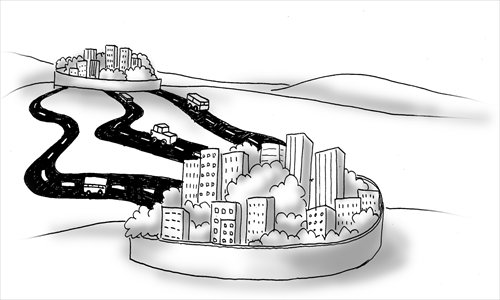Myanmar public should be won over to understanding of China’s helpful role

Illustration: Liu Rui/GT
Myanmar's general election is around the corner as both internal and external forces compete over the country's future. Whatever the results of the election, the complexity of China-Myanmar relations will not have any fundamental change. Given Myanmar's diverse political forces, complicated democratization process and sharp ethnic conflicts, public opinion will maintain its strong influence on the country's policy.
For the political elites and scholars in Myanmar, China, as by far the country's largest neighbor, has irreplaceable influence on Myanmar's geopolitical and economic development, and Myanmar also plays a unique role in China's peripheral diplomacy and geopolitics. Both sides have demands for more cooperation.
So far, the Myanmar government and scholars have been relatively positive about the bilateral relationship, but the public holds the opposite opinion. After the China-funded Myitsone dam project was suspended in September 2011 and protests broke out against China-backed Letpadaung copper mine in December 2014, anti-China sentiments have been fermenting.
Besides, Myanmar faces conflicts between the central government and local ones and among ethnic groups, and in particular the negative impact of the ethnic armed groups on China-Myanmar relations is expanding. Some NGOs, private media and extremists have tried to hype the China threat and hence affect Myanmar people's perception of China.
While China's investment in Myanmar for many years is conducive to bilateral relations, it has yet to adequately publicize some of its programs. The Myitsone dam project was seen by locals as merely for China's own benefits. Moreover, some Chinese enterprises only eye immediate interests while neglecting those of locals. Criminal activities around the border of China and Myanmar, such as smuggling and drug trafficking, are considered threatening to Myanmar and widely reported by media outlets, particularly private ones, which also fosters sentiments against China.
Myanmar's relations with the US have been warming. Washington has adopted various approaches to back Myanmar's democratic reforms, such as adjusting its sanctions and exerting its influence through NGOs. As enterprises of the US, Japan and India keenly vie for market share in Myanmar, China's investment room is squeezed out.
Given Myanmar's geopolitical importance, the West's intentional wooing and the country's strategic significance to China, the Myanmar government and political elites only stress the friendship with China on a government and diplomatic level and act capriciously or even aggressively in strategic economic cooperation and other specific issues. The Myanmar government is unable and also unwilling to rein in the negative reports and publicity on China.
The long friendship and historical inheritance between Myanmar and Chinese people risks being eroded. Without winning over the Myanmar public, China's aid and donations to the country will be misinterpreted as ill-intended. Here are some suggestions to change Myanmar people's negative feelings for China and restore the popular support for the friendship.
In developing the bilateral relationship, China needs to make priority the enhanced trust between the two peoples. Political elites, scholars and civic groups can play their roles and carry out well-planned and continued activities of public diplomacy and people-to-people exchanges. Swarming to amend ties only when problems arise will be counter-productive.
Besides, think tanks need to be encouraged to play their roles and gain a better understanding of Myanmar's political and public situation. There should be small-scale and specific programs to disperse the risk of investment. They also need to conduct more studies on bilateral cooperation in the aspects of investment direction, market demands and investment risks. In particular, China has to work with Myanmar to make sure economic cooperation programs can reach out to local people.
As the majority of Myanmar people live in the countryside and depend heavily on agriculture, China can help Myanmar build up an agricultural products processing park, which is more cost-effective than an industrial one. China can provide aid in technology, funds and human resources to help Myanmar gain higher added value from the processing of agricultural products and enhance its exports, so that more jobs can be created and farmers can have more income.
The illegal trading, smuggling and human trafficking in the border areas of China and Myanmar have caused many problems. Although some happened in Myanmar-administered regions, China still has to help Myanmar solve the problems and make sure that the Myanmar public is well aware of China's efforts.
The author is deputy director of Research Institute for Indian Ocean Economies at Yunnan University of Finance and Economics. opinion@globaltimes.com.cn